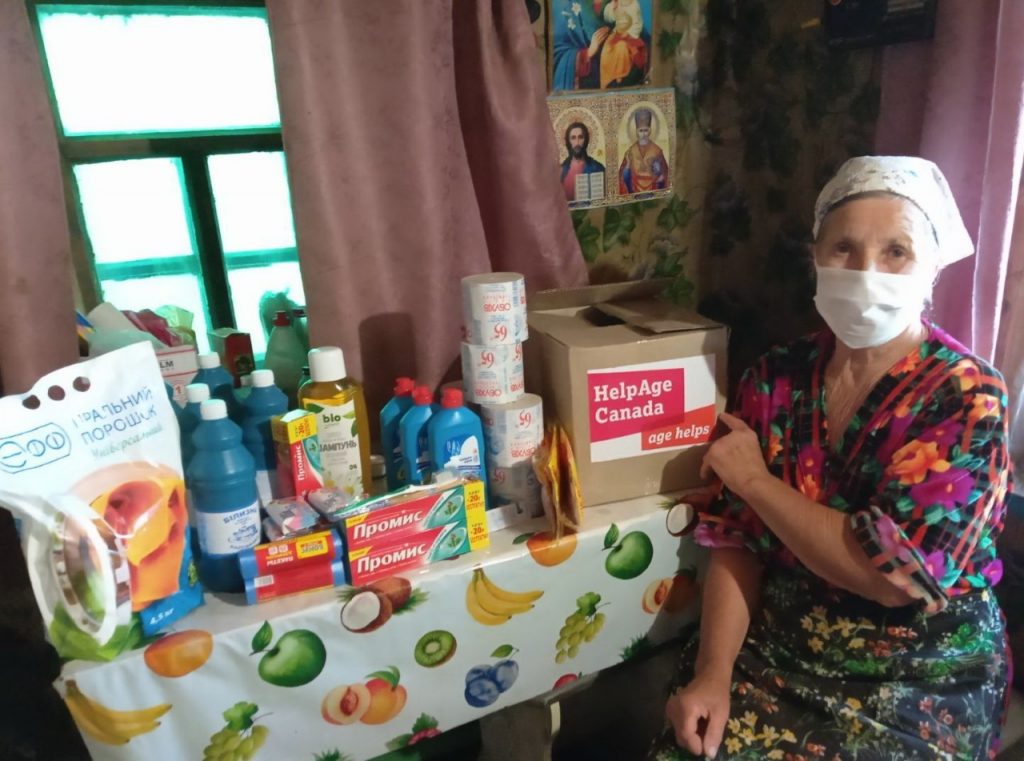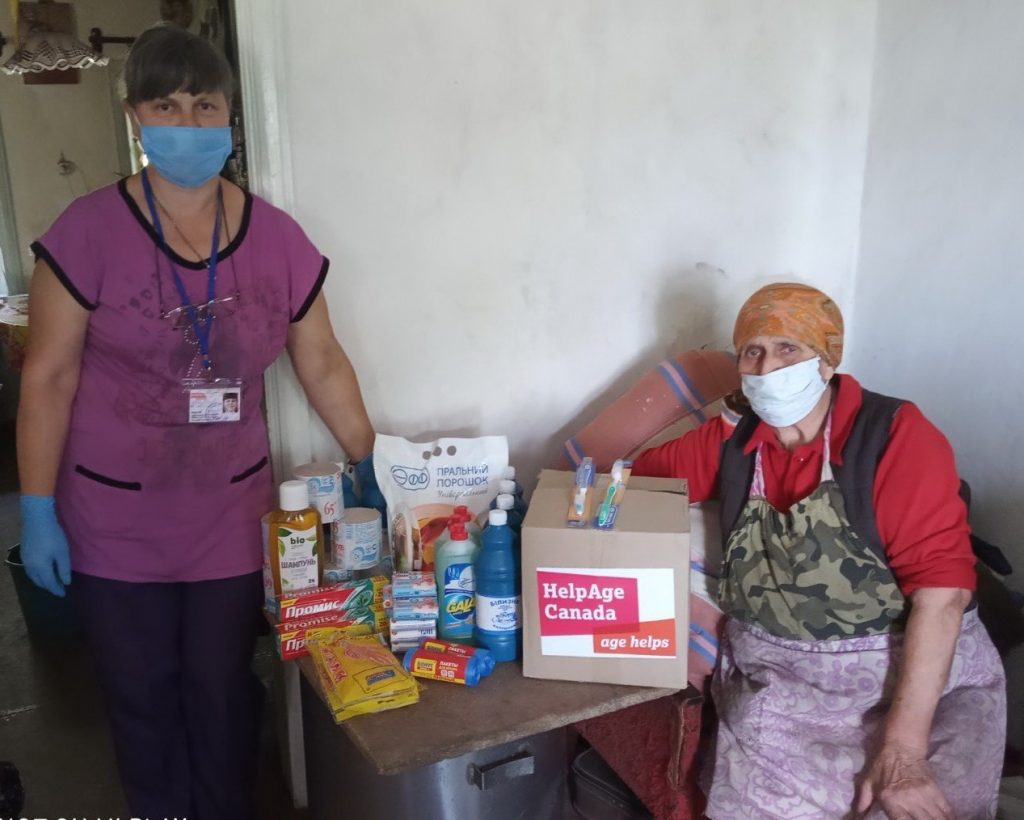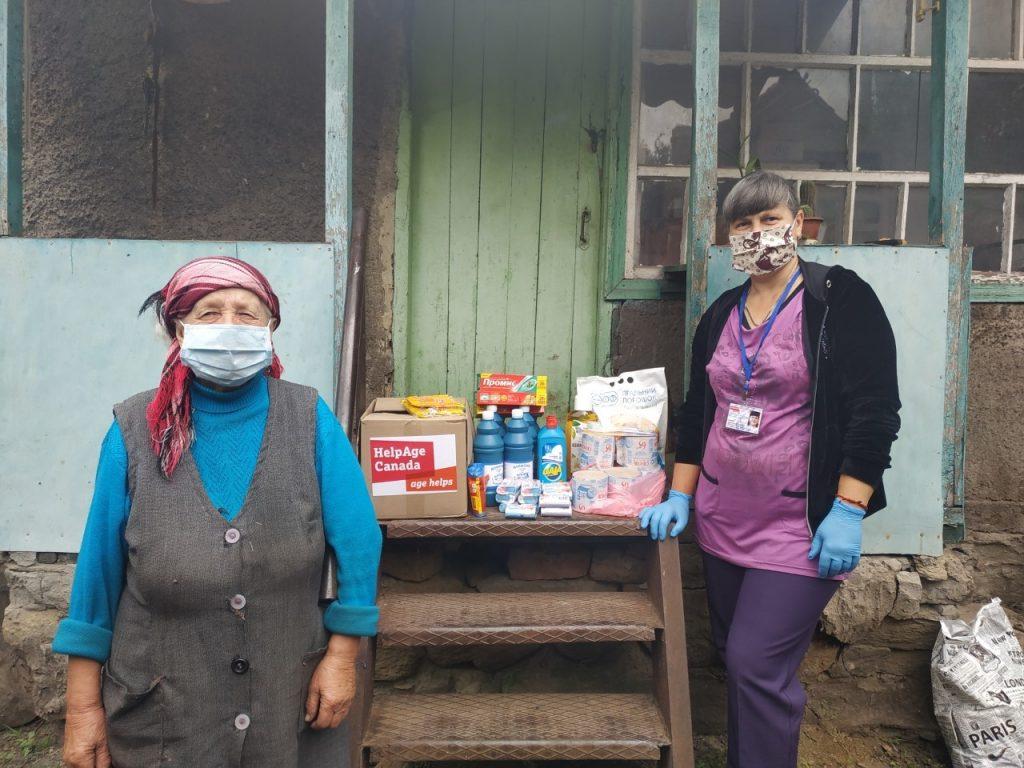Posted on August 10th, in News
From May 2020 to July 2020 HelpAge International in Ukraine implemented the project aimed to reducing the risks of coronavirus infection among older women and men living along the contact line (0- 5) in government-controlled areas (GCA) in Donetsk and Luhansk regions with financial support from HelpAge Canada.
The project covered 20 settlements in the Donbass area, Governmental-controlled area (GCA).
Donetsk region – settlements: Marinka, Krasnogorivka, Taramchuk, Stepne, Novomykhailivka, Novobakhmutivka, Zalizne, Opytne, Vodiane, Pervomaiske.
Lugansk region – settlements: Novotoshkivske, Nyzhnie, Orikhove, Troitske, Komyshuvakha, Zolote, Stanitsa Luhanska, Makarove, Petropavlivka, Valuiske.
For implement the project HAI recruited one project officer (PO) in each region, one project assistant (PA) and 10 community volunteers (CVs). All these people were employees of HAI in a previous project funded by ECHO, so they are aware of the policies of HAI, humanitarian principles and rules of personal safety and protection of the older people. Before the start of the project implementation the POs conducted a short update training on the rules of working in a pandemic, the using of Personal Protective Equipment (PPE) and understanding the project’s objectives for volunteers and PAs. Also, when choosing volunteers for the project, we took into account the factor that each of the 20 settlements should be covered by one of our volunteers in order to ensure better access to the beneficiaries and the delivery of non-food items (NFI). The major focus was on provision of COVID-19 adapted hygiene kits, personal protective equipment, COVID-19 prevention through information sharing and guidance on steps needed if one has symptoms and also provide remote psychosocial support via regular check-in mobile phone calls and a HelpAge ‘telephone hotline’ provide accurate and update information on COVID-19.
Additionally, volunteers provided the First Psychological Aid during the visit and provided information about the available services for the older people in specific localities. Since the project is aimed at quick response, it was decided to focus on the beneficiaries of the previous project “ACCESSIII” funded by ECHO. This decision made it possible to save time on additional needs assessment as it relied on its own database of older people. Considering that the ECHO project ended in April and we distributed only sanitizers at that time we have had evidence on high need of hygiene products. Also, according to WHO recommendations, adherence to personal hygiene rules and social distancing are the main factors in curbing the spread of coronavirus infection.
Key achievements
HAI project assistants with the support of volunteers conducted previous database verification. HAI Finance/Log Department selected suppliers in accordance with the HAI procurement procedures and policies. 1000 hygiene kits were purchased (around 16 tons). 1000 stickers with HelpAge Canada and HelpAge International logos were printed for ensure visibility. When forming the set, HAI also guided by the recommendations of the WASH Cluster developed as part of the response to COVID-19. The quantitative composition of the kit is designed for use within three months. Please see Annex 1 for hygiene kits composition. Since the start of the pandemic, we have experienced significant price fluctuations. But since the purchasing power of the population fell, suppliers began to reduce prices for wholesale buyers. Consequently, HAI was able to procure a hygienic kit for three months at the cost of the kit budgeted for one month. Considering that all beneficiaries have chronic diseases and serious health problems, the assistance provided will help significantly reduce the risk of contracting coronavirus infection, improve the quality of life of the beneficiaries and help them adhere to the self-isolation regime.
As at the end of July 2020 the distribution process is coming to an end. A total of 917 sets were distributed. The remaining 51 packs will be delivery to the older people during last week of July 2020. HAI also continued collecting photos and video stories. Unfortunately, during the implementation of the project 32 beneficiaries died, so the hygienic kits will be kept in HAI warehouse and will be delivered to the new beneficiaries as soon as they will be identified in August 2020.
HAI continues providing advocacy through Age and Disability Technical Working Group (ADTWG) on amplifying older people’s voices for ensuring that they are involved in decision-making and that their dignity and autonomy are respected in pandemic. HelpAge chairs the Technical Working group on Age and Disability (ADTWG) formed under the UNOCHA Protection Cluster. The ADTWG aims to strengthen the coordination and capacity of the humanitarian actors to develop and implement age and disability-friendly humanitarian response.
Key numbers
Summary information on beneficiaries included in the 041 project as of 24.07.2020

Photos from the distribution






ANNEX 1
Hygiene Kits composition.
| # | Description | Remarks |
| 1 | Toothbrush | 2 pcs |
| 2 | Toothpaste | 300 ml |
| 3 | Soap bars | 13 x 75 g soap \(900 g total) |
| 4 | Shampoo (hypoallergenic if possible) | 750 ml |
| 5 | Washing powder for clothes, universal and hypoallergenic | 4.5 kg |
| 6 | Liquid Bleach | 6 of 1-liter containers |
| 7 | Dishwashing gel / Washing-up liquid | 1,5 liters |
| 8 | Toilet Paper | 6 rolls |
| 9 | Garbage bags (35 Litres) | 2 rolls of 30 pcs |
| 10 | Rubber gloves for cleaning | 3 pairs |














